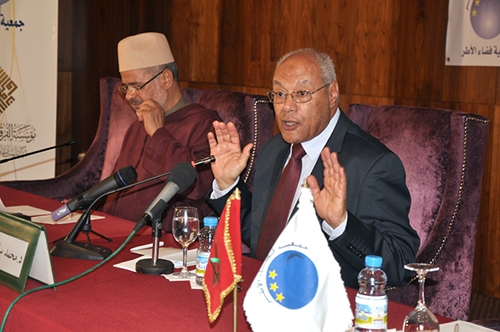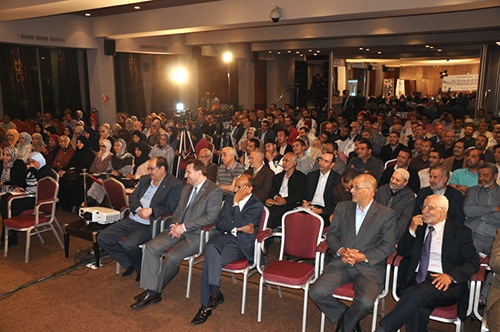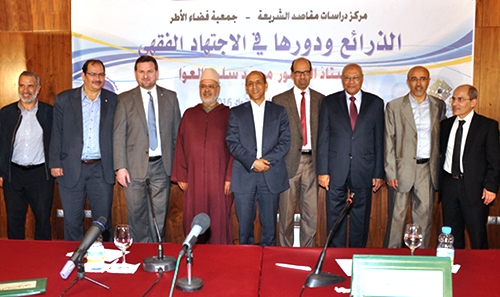The lecture titled “The means (al-dharāi‘) and their role in creative juristic effort (ijtihād)” was delivered by Professor Mohamed Salim El-Awa, on Monday 2 May 2016, at Avanti Hotel in Mohammedia, Morocco. The lecture was organised by the Centre for the Study of the Philosophy of Islamic Law at Al-Furqān, in co-operation with Association Espace Cadres and the Maqasid Research & Studies Centre.

The event was chaired by Professor Ahmed al-Raissouni, who praised the importance of the topic and the eminence of the lecturer. Professor El-Awa then started his lecture by defining the precepts and evidential basis attached to the origin of the legal theory of means (al-dharāi‘). He also addressed the practices in its juristic application, and discussed the pioneering status of the Mālikī school of jurisprudence in adopting creative juristic effort (ijtihād) using means (al-dharāi‘). Indeed, he posed an important question regarding whether this had remained limited to the Mālikī school, or had become generalised to all areas of jurisprudence. Professor El-Awa emphasised that the idea of means (al-dharāi‘) exists in the Revelation texts, where means (al-dharāi‘) is principally a legislative matter. He based his argument on the submissions by Imām Ibn al-Qayyim in his text “A‘lām al-muwaqi‘īn”, in which he included comprehensive classical proof for the idea of means (al-dharāi‘), giving 99 examples from the Noble Qur’ān, Prophetic tradition (Sunnah), and consensus (ijmā‘), to form justification for the use of means (al-dharāi‘) as an approach in creative juristic effort (ijtihād).
Professor El-Awa dwelt on the term “means” (al-dharāi‘), explaining its lexical semantics, which revolve around “mean”, “way”, and “path”. He then moved on to explain its significance based on usage by legal theorists (al-uṣūliyyūn). He mentioned that this was of two types: the first is “blocking the means (sadd al-dharāi‘)”, which he defined in the statement: “[normally] allowed means that are disallowed, where they would lead to the prohibited; whether disliked (makrūh) or unlawful (ḥarām)”. This is because legal theorists judge means according to the objectives (maqāṣid) achieved. Professor El-Awa gave examples for some of the means that are permitted in principle, but then prohibited considering the outcomes they may lead to. For example, entry of servants and young persons into family sleeping quarters during rest times, as articulated in the Qur’ān:
“O you who believe, let those whom your right hands possess and those who have not [yet] reached puberty among you ask permission of you [before entering] at three times: before the dawn prayer and when you put aside your clothing [for rest] at noon and after the night prayer. [These are] three times of privacy for you. There is no blame upon you nor upon them beyond these [periods]…” [al-Nūr 58].
Indeed, entry to sleeping quarters is allowed in principle, but has been prohibited during these specific times, as it may lead to corruption. This corruption may be disliked (makrūh), yet the Qur’ān prohibited it by prohibiting the means leading to it. The lecturer also provided examples of blocking the means in some contracts, where the contract may be allowed in terms of form, but may be prohibited if it results in usury.
Professor El-Awa also added that some acts may be permissible (mubāḥah) or recommended (mandūbah) in principle, such as insulting the idols, which undermines their status and gravity in people’s hearts. However, the Qur’ān prohibits this, because it may be taken as an excuse to insult God: “And do not insult those they invoke other than Allah, lest they insult Allah in enmity without knowledge…” [al-An‘ām 108]. Similarly, from the Prophetic tradition: “it is the gravest of major sins for a person to insult his parents”. It was said: O’ Messenger of Allah how can a person insult his parents? He responded “the person insults the father of the other, who responds by insulting this person’s father”. In addition, there are other examples mentioned in the Prophetic tradition that emphasise the idea of consideration of the means. Indeed, Imām Ibn al-Qayyim considered means as one quarter of religious responsibility (al-taklīf).
Subsequently, Professor El-Awa moved to the second type of means, which is “opening the means (fatḥ al-dharāi‘)”. He explained that these were means that led to what is required. He emphasised that it is obligatory to adopt those means that lead to achieving the obligation (al-wājib), while it is recommended to adopt those means that lead to the recommended (al-mandūb), and it is permissible to adopt those means that lead to the permissible (al-mubāḥ).
Among those examples presented by the lecturer, was the matter of having sight of the private parts. Indeed, having sight of the private parts of other persons was prohibited in principle, but given the ratio legis (al-‘illah) of the need for diagnosis and treatment to preserve life, this ruling changed.

The lecturer indicated that many legal theorists have employed the means intimately connected to closing (al-sadd), as these lead to wrongdoing; however, this is a matter of juristic disputation (khilāf). In contrast, opening the means (fatḥ al-dharāi‘) has not caused any significant disagreement. Professor El-Awa emphasised that means may be opened as they may be closed. These are covered by five rules, in consideration of what they may lead to, in terms of interests (maṣāliḥ) or evils (mafāsid). In this instance, he mentioned the rule that: it is recommended (mandūb) to close the mean that results in something disliked (makrūh), and it is disliked to open it.
Having defined and set the evidential foundation, and also provided examples of means, the lecturer moved on to discuss means in terms of legal theory (uṣūl al-fiqh). He discussed the classification by legal theorists of the means among those evidences over which there is disagreement. Professor El-Awa criticised the consideration of means as evidence (dalīl) or principle (aṣl), arguing that means were a ruling (ḥukm), whose evidence is the concrete interest (al-maṣlaḥah al-muḥaqqaqah) rather than the baseless interest (al-maṣlaḥah al-mutawahhamah). Therefore, he proposed at the end of his lecture that the means be referred back to those books of rules (qawā‘id) and objectives (maqāṣid), because these represent the area in which the means are located.

Following the conclusion of the lecture, the audience had the opportunity to interact with the lecturer. The majority of questions revolved around the necessity of establishing rules for the means. In responding to the audience’s questions, Professor El-Awa explained that such rules were a matter of creative juristic effort (ijtihād), and many were linked to time-dependent issues, which would then change with the changing times, place, and customs. Professor El-Awa concluded by reflecting on women’s issues that have been negatively addressed, due to the miss-application of closing the means (sadd al-dharāi‘). He emphasised that the means must not be raised as an obstacle to women, preventing them from realising their civilisational role.

